





Published on Nov 30, 2023
Gold mines Crushed Black stones are one of the primary waste products of mining operations of Hutti Goldmines Limited. They comprise of Stone chips and dust of the parent rock from which the ore is extracted. The characteristics of Gold mines Crushed Blackstone depend upon the composition of parent rock. The disposal of this material is a major environmental problem for the mining industry. Among the 960 million tons of solid waste generated annually in India, nearly 290 million tons are inorganic wastes of industrial and mining sectors. The gold mining industry at Hutti village in Raichur district of Karnataka is producing abundant quantity of tailings and Crushed Blackstone which is un-utilized for several years, for extraction of 1 gram of gold, 1 ton of waste material is generated; Annually Hutti goldmines limited is generating nearly 50 million tons of waste containing tailing and crushed Blackstone. There is no vegetation on dumps, which leads to release of fine particles into the atmosphere due to wind erosion. This causes air pollution in the area. The tailings and Crushed Blackstone have affected the landscape and topography of the area as well. Hence, it is essential to find some way to use the Gold mine wastes.
Fine and coarse aggregates are becoming scarce and meeting the demand of aggregates in the construction industry is becoming a challenging task. In this investigation an attempt is made to utilize Gold mines Crushed Blackstone as a substitute for coarse aggregates in producing concrete. Further Gold mines Crushed Blackstone referred as GMW coarse aggregate and concrete made of it is referred as GMW concrete. The acceptability of utilizing goldmine tailings as a substitute to sand in concrete production was found to be satisfactory on the basis of compressive strength and durability.
This study is initiated to assess the suitability of Gold mines Crushed Blackstone as substitute for coarse aggregate in concrete. The evaluation was based on parameters such as physical properties of materials, workability, compressive strength, flexural strength and durability.
A Hutti goldmine is in the nearby locality of Kalaburagi, black stone is available in large quantity. Therefore to utilize this waste following objectives have been framed
Keywords : Goldmines waste (GMW) coarse aggregates, compressive strength, flexural strength and durability.
1) Chemical analyses of goldmine waste coarse aggregate.
2) To study the physical properties of goldmine waste as a coarse aggregate.
3) To study the fresh state properties of concrete using goldmine waste as a coarse aggregate.
4) To study the strength properties of concrete using goldmine waste as a coarse aggregate.
5) To study the durability property of concrete using goldmine waste as a coarse aggregate.
Ordinary Portland cement confirming to IS: 1489-1991[6] was used.
Locally available sand belonging to zone II is used as fine aggregate.
Coarse aggregates available from local crusher were used. Here we have used two size fractions of Coarse aggregates i.e., fraction 1 (20mm Down size) and fraction 2 (12.5mm down size) were used in the present study.
Crushed Blackstone taken from Hutti Goldmines Limited was manually crushed and used as 100% replacement to locally available coarse aggregates, because of difficulty in manual crushing only 20mm and down size has being used.
Super plasticizer used in the present investigation was Addage plast PCE 840. For M40 grade concrete.
Trial Casting
Indian standard institute has brought out mix design procedure mainly work done in national laboratories i.e., covered in IS 10262-2009 to obtain the medium strength concrete. Two Grades of concrete mix i.e., M20 and M40.
Mixing is done on hard surface manually. First the sand and cement taken in correct proportion and mixed in dry state. Then the coarse aggregate is added and mixed well using trowels. The predetermined amount of water is added and mixed till the color is homogeneous and the mix is workable.
Cubes specimens of size 150×150×150mm and Beam specimens of size 100x100x500mm were cast using the finalized mix proportion from Table No. 1 for M20 and M40 grade concrete (control mix and GMW Concrete).
The specimens were kept in water tank and cured as per IS standard, water being changed at regular interval. After the period of curing the specimens were taken from water tank and allows to dried the specimen and then the specimen were tested.
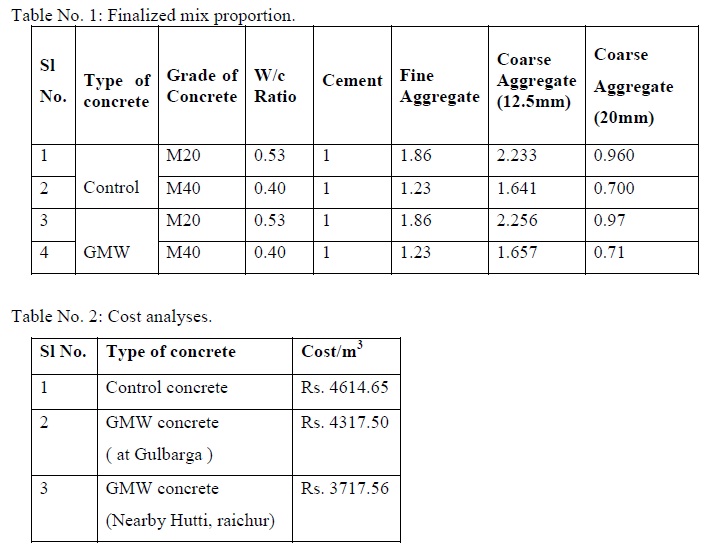
Table No. 3: Compressive strength results.
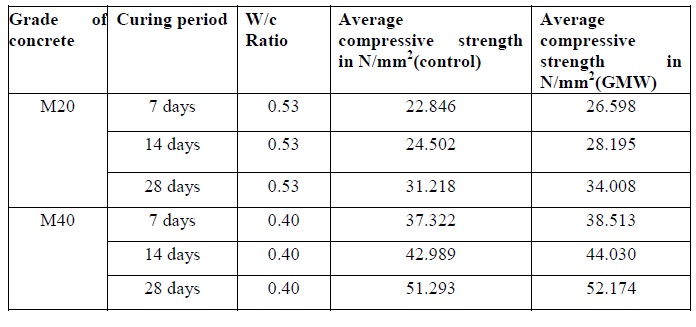
Table No. 4: Flexural strength results.
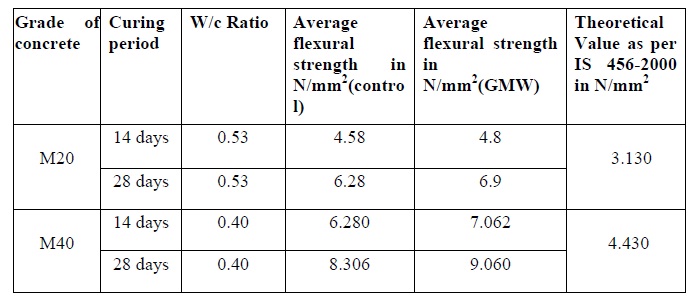
a) Permeability Test
Table No. 5: Permeability Test results.
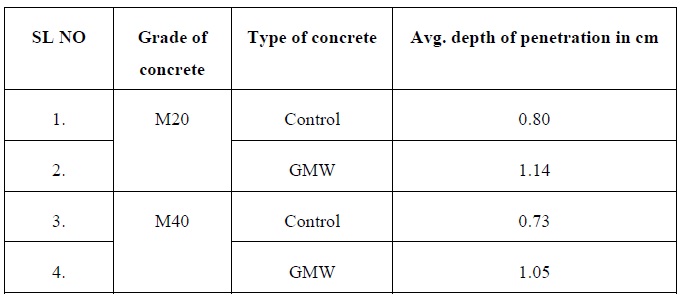
Table No. 6: Chloride attack Test results.
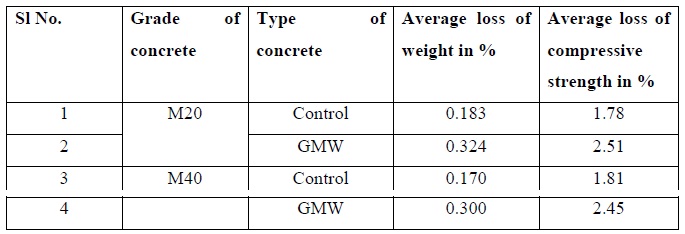
a) The specific gravity for both locally available and GMW Coarse Aggregate are same but Variation in Fineness modulus and bulk density due to manual crushing of GMW coarse aggregate. The water absorption of GMW coarse aggregate is higher than local aggregate.
b) GMW coarse aggregate are stronger as compare to local coarse aggregate, this evident from the results of crushing value of both the aggregate.
c) The workability of local and GMW coarse aggregate is nearly same in terms of slump.
d) For M20 and M40 grade concrete, the compressive strength of both control and GMW concrete has exceeded the target mean strength. The compressive strength of GMW concrete is higher than the control concrete. The relation between 7 and 28 days compressive strength is agreement with the various researchers.
e) For M20 and M40 grade concrete, the flexural strength of both control and GMW concrete has exceeded the theoretical value of flexural strength. The flexural strength of GMW concrete is higher than the control concrete. The relation between flexural and compressive strength at 28 days is agreement with the various researchers.
f) From permeability tests results for M20 and M40 grade concrete, the depth of penetration of GMW concrete is higher as compare to control concrete, this may be due to high water absorption of GMW coarse aggregate.
g) Concrete using Goldmines waste coarse aggregate is resistant to chloride attack after immersion for a period of 28 days
h) As per cost analyses, concrete using GMW coarse aggregates is economical than concrete using local coarse aggregates, the more economy can be achieved if it is used nearby Hutti goldmines Raichur.
In this present study, the local coarse aggregate is fully replaced by goldmines waste (coarse aggregate) in preparation of concrete, which were not influenced on the fresh and hardened state properties.
a) Cost optimization by using Goldmines waste near the Hutti Goldmines industry.
b) Use of Goldmines waste fine aggregates as replacement to natural sand.
c) Use of Goldmines tailing as a partially replacement of cement in mortar.
d) Goldmines waste coarse aggregate can be used in a pavement construction.